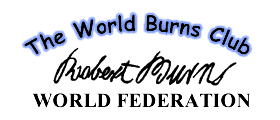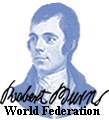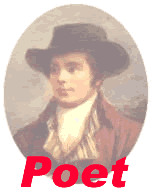


 |
 |
 |
 |
|||
| ON A TIGHT ROP |
|||
|
An
Expert Article contributed by Sam K Gaw - "To
give my counsels all in one, (From "The Vision" by Robert Burns) |
|||
  SCOTLAND
- "Land of the Mountain and the Flood" according to the old song,
an aspect not immediately apparent to the visitor landing in our lowland
airports or viewing our cities. The Visitor attractions, Museums and Art
Galleries depict fighting and dying warriors, be it the thin red line of
kilted soldiers in the Crimean War, the sabre slashing heroes of Waterloo
destroying Napoleon's hope of European Union ?under his dictatorship. SCOTLAND
- "Land of the Mountain and the Flood" according to the old song,
an aspect not immediately apparent to the visitor landing in our lowland
airports or viewing our cities. The Visitor attractions, Museums and Art
Galleries depict fighting and dying warriors, be it the thin red line of
kilted soldiers in the Crimean War, the sabre slashing heroes of Waterloo
destroying Napoleon's hope of European Union ?under his dictatorship. |
|||
|
SCOTLAND - Home to a Martial Race, yet its best-loved patriot is no military hero but a Poet - Robert Burns - who is regularly celebrated lavishly and reverently. No parochial festivity this, for people all over the world will celebrate his life and message for mankind.
In an early poem,
"The Vision", Burns lists
many of the noble families of Scotland. He obviously yearned for a situation
where our nobility was noble. Their daring, their benevolence is praised,
the trust and certainty that they will fulfil their nation's need, be
they soldiers like "The Chief on Sark who glorious "The Vision" ends with the Muse placing the holly mantle on Burns' head and concludes with the couplet "And like a passing thought, she fled in light away". This was probably inspired by Watt's version of Psalm 90 "They fly forgotten as a dream dies at the Opening Day" An acceptance that the old days were gone. BY nature, Burns believed in the natural goodness of mankind, accepting their failings. This was best expressed in a letter he sent to Peter Hill an Edinburgh Bookseller, while voluntarily acting on behalf of a Friendly Society Library. His book order contains a remarkable reference to his philosophy: "God knows I am no Saint, I have a whole host of sins and follies to answer for. But if I could, and I believe I do it when I can I would wipe away all tears from all eyes". SON of a struggling tenant farmer, a douce Presbyterian, who believed that education was the greatest gift one could bestow on his family, the Poet was educated better than the sons of many wealthy landowners. His father and some local farmers co?operated in the hiring of a teacher, John Murdoch. It is remarkable that these poor farmers should acquire the services of a scholar who was later to be the tutor of Count Telleyrand, the French statesman who created Napoleon and subsequently deposed him. That his genius could be blinded however can be seen from his report on Robert Burns and his brother Gilbert: "Gilbert Burns has a lively imagination. He has more wit than Robert who is remarkably dull. Robert has no ear for music, and what little he has is completely untunable" No ear for music! The man who wrote, collected and saved for the Nation over 370 Scottish songs. Burns was possibly a late starter. His first foray into Poetry was at the age of 15, a song to a young lady, Nelly Kilpatrick, his companion when working in the cornfield. She had a good singing voice and the song was set to her favourite tune. Simple verse, but this started a pattern for in every song as he wrote, the tune would be running through his head. Hence the original tunes suit the metre better than those of more recent setting. ' Apart from a foray to the Royal Burgh of Irvine, there to earn the linen trade and its merchandising, he remained a farmer writing when his labours permitted. These 12 years produced only three additional songs and a collection of poems which blasted the hypocrisy and laid bare the greed and oppression which had intensified and destroyed that paternalism and eroded the classlessness that typified the Scottish psyche, the "kent his faither" syndrome. From his first attempts at poetry he realised that inequality and poverty destroyed personal freedom and without that, national independence and international security was impossible. "Here's
freedom to them that wad read,
"Man was Made to Mourn" tells of "man's inhumanity to man" and was inspired by his meeting an 80 year old man kicked out to beg after a lifetime of service to a haughty Lord. "If I'm designed Lord Cassillis'
slave Powerful stuff! Can one wonder that Wilson, the artful printer, kept it anonymous by substituting "You Lordling's Slave" for "Lord Cassillis", especially as the culprit and other Ayrshire nobles were keeping his print shop busy. The first poem "The Twa Dogs" illustrates the tightrope walker. What better way to attack the failings of commoners and gentry, without offence taken, than to have the wisdom poured from dogs of extreme classes. Scotland was famous for its varieties and almost every family, Lord or Peasant, owned one or more.
Freemasonry was the last bastion of Scottish society which allowed rich and poor, but not illiterate, to meet in harmony. In the West that organisation's membership included working craftsmen. But those in the Capital seldom saw dirt under their fingernails. Introduction by masonic friends saw Burns launched in Edinburgh, the toast of Scotland's Capital, toasted by the Grand Lodge of Scotland as Caledonia's Bard and feted by the wealthy; the great and the good of the Scottish enlightenment, scholars, lawyers and writers. Those who put Scotland first resisting the blandishments of London, Blasted the Poet to fame.
What better media for presenting anti?Government sentiment than a collection of folk and Jacobite song. "The highland Widow's Lament" tells of a widow driven by hunger to the Lowlands: "Till Charlie
Stuart came at last, Sae far to set us free. Here the Poet states the oath taken by the Stuart followers "Freedom to Scotland and no Union".
Again the subterfuge ? "Written to an old song believed to have been used at Bannockburn" ? was used in its introduction. IT has been wrongly suggested that "Parcel of Rogues in a Nation" is anti-English when in fact it is an indictment against the Scottish establishment who drew up the Treaty of Union in 1707, under the great yew tree at Loudoun Castle in Ayrshire, which the Poet claimed "robbed Scotland of its very name". "What force
or guile could not subdue A reference to the monies paid to the parliamentary participants. The Farm at Ellisland was a ruinous bargain and, when sold, the final years of his life found him in Dumfries at his excise duties. Duty bound to uphold the law only landowners elected representatives to Parliament. These selfish people brought in the Corn Laws to prevent import of grain, and to keep the prices high, while the poor were starving. Corn riots occurred in Ayrshire and Dumfries and inspired by the Revolution in France dissidents raised, as a symbol of revolt, the Tree of Liberty and the populace danced around in a show of solidarity. Smuggling
became a principle occupation and perhaps half heartedly it was pursued
by this exciseman, extolling universal brotherhood: It was not the exotic items of romantic fiction, the wines and brandy that were the principle illegal imports, but Irish grain feeding a starving peasantry. Another step on that tightrope was taken by the Poet when, as his duty, it was expected of him to join the regiment of Dumfries Volunteers. The threat of French invasion and rabble rousing had the country scared. If this did nothing else it gives politicians the right to claim Burns as their own. From his song, oft quoted ? "Does Haughty Gaul Invasion Threat" come the couplets For Unionists: "Never but by British Hand maun British wrangs be righted" For Royalists: "Wha willna sing "God Save The King" will king as high as the steeple" And for those who prefer a people's choice and Burn's: "But while we sing "God Save The King" We'll never forget the People" The song did more than provide political quotations. It alerted libertarians against the ambitions of the military dictatorship in France, one as evil as that of Hitler a century and a half later. That he walked the tightrope successfully and achieved most of his aims against censorship can be judged from his attack against a repressive Kirk in Scotland. The excesses of the Kirk were exposed by a satirical pen in "Holy Willie's Prayer", the drunken, lecherous, thief of a Kirk Officer, paid to spy on the villagers and report their misdeeds. The Poem, written in 1780, was enacted throughout Scotland, passed from hand to hand, mouth to mouth and the ensuing gale of laughter cleansed the temple. No?one dared to print "Holy Willies Prayer" until five years after the Poet's death.
Every year, people all over the world, some knowing but one song of his, the international song "Auld Land Syne" remember this man -The Poet of Mankind ? and "tak a cup of kindness" to a saintly sinner. Article contributed
by Sam K Gaw This article previously appeared in the magazine "Scottish Highlights"
|
|||
|
© 2008 The Robert Burns World Federation
|
|||